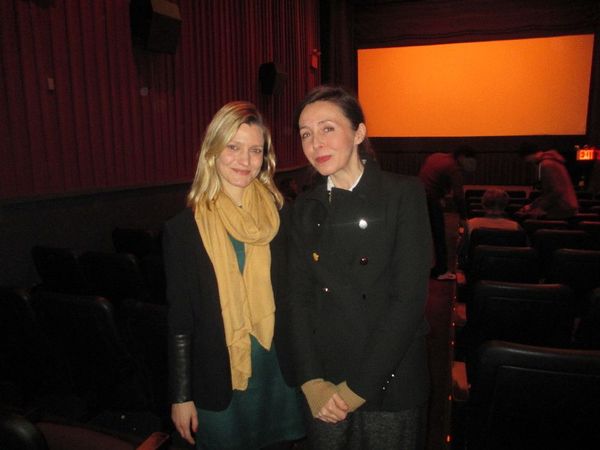 |
| Little Accidents director Sara Colangelo with Anne-Katrin Titze on casting Elizabeth Banks: "I had seen her in W and I loved her in the role of Laura Bush." Photo: Anne-Katrin Titze |
On a bitterly cold evening following a sold out opening night screening in New York at Cinema Village's #1 theater of Sara Colangelo's smartly woven Little Accidents, starring Elizabeth Banks, Boyd Holbrook, Jacob Lofland, Josh Lucas, Chloë Sevigny with Beau Wright, Alexia Rasmussen and James DeForest Parker, I spoke with the director and producers Anne Carey and Summer Shelton and the enthusiastic audience joined in.
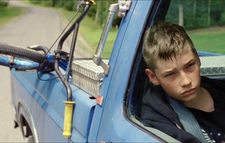 |
| Jacob Lofland as Owen: "In the case of Owen's storyline, you might feel the horror of it more standing back." |
As we were waiting for the screening to conclude, Sara mentioned to me Mike Nichols' Silkwood, Atom Egoyan's The Sweet Hereafter and John Ford's How Green Was My Valley as inspirations. I shared with her two great recent examples of filmmakers tackling a similar terrain on how to approach disasters in a rural community in a cinematic way: Sofia Norlin's Broken Hill Blues and Rebecca Zlotowski's Grand Central.
Little Accidents takes us to an Appalachian mining town, ravaged by disaster haunting the community. Guilt and circumstance, the push of decision making and the pull of longing, unite two inhabitants to form an unlikely bond with another. Amos [Holbrook], the sole survivor of a mining accident, Diane [Banks], the wife of an executive [Lucas], who might have some responsibility and whose teenage son goes missing, unite in the central triangle with the boy Owen [Lofland], whose father was killed in the mine and who has a secret of his own.
Anne-Katrin Titze: Please welcome the film's director Sara Colangelo and two of the producers, Anne Carey and Summer Shelton. I would like to start with the script. Were you starting out with individual characters and then developed their actions? Or was the beginning the constellation of those people in the town?
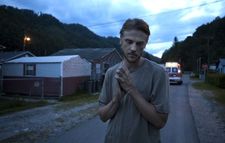 |
| Boyd Holbrook as Amos Jenkins: "…at first I thought that he was maybe too good-looking for the part of Amos." |
Sara Colangelo: That's a good question. I knew that I wanted it to be very storyline braided together. I knew I wanted to take this idea of Amos as a sort of debilitated soul. That was something from the short film I had done at NYU and was my thesis. There's an Amos character in that short film. I didn't know if I was setting it in coal country yet but I knew I had this idea of an accident, a traumatic event, that's set in the past. The audience is sort of piecing together that as the film unfolds and you're looking at how this accident reverberates on a community around a cast of characters. But you're never seeing the accident on screen.
That was the seed. And an image I had was a boy in the woods with a secret and another was Amos. And once I set the piece in coal country, I thought it would be really interesting to get the other side of a coal mine disaster - the executives, the people that could be culpable. And then I came up with the idea of Diane Doyle, a housewife creating this wall of materialism around her, who is totally isolated within this town, who is very much an outsider. That's how it sort of came together.
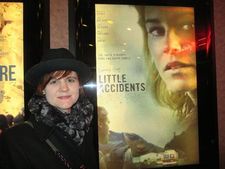 |
| Little Accidents producer Summer Shelton on Jacob Lofland: "He has that face, before he even opens his mouth you want to know what he has to say." Photo: Anne-Katrin Titze |
AKT: I love your start with thunder and that sky. We forget about it, until the weather is brought up again. Could the accident have been caused by the rain? There is the beginning of gaps. You have the same at the ending. We see part of one story and hear part of another. Can you talk about the gaps, the way you show us an entrance way into another's world and then leave us to figure it out?
Sara Colangelo: Right. You hear one man's confession, which is Amos's, but you don't see it. You don't ever see the accident. And yet in the other case, you have all the information because you've seen that accident and yet when you experience his confession, you don't hear it. It's through the window. That was never really conscious. It's a story about two confessional moments. In the case of Owen's storyline, you might feel the horror of it more standing back.
Anne Carey: And the intimacy. The intimacy of what you don't hear, of what you imagine is stronger than had we shown it.
AKT: Anne, what attracted you to the script? How did you get involved?
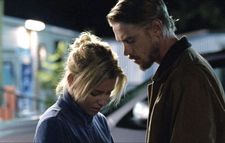 |
| Elizabeth Banks as Diane with Amos: "Elizabeth's pursuit of us was a big compliment to the project and a reflection of its strength." |
Anne Carey: What attracted me to the script was the ambition of the script because I think it would be typical in a script by a young filmmaker to tell one character's story. The thing that really attracted me to Sara's script was the fact that she took on. really ambitiously, the portrait of the town and the multiple storylines. That's incredibly rare and Sara was really in control of that idea.
AKT: What about you, Summer?
Summer Shelton: I was very excited initially about working with a female filmmaker, a writer/director. In terms of the story, I'm from this part of the world a little bit. I've always made films mainly about slice of life and people who don't often get their stories told. Even though this is just a small piece of a pie that's America, everyone in the world should be able to identify with this. Because it's a story about loss and grief and how people deal with moving on. Hearing it through this town, as a group and as individuals they all are doing it in a different way. There was so much texture in the story.
Anne Carey: And it was never judgmental. We used the word anthropological a lot. The idea that Sara had that was really present in the script, was never looking down on this town. She was looking at everybody, straight in the eye.
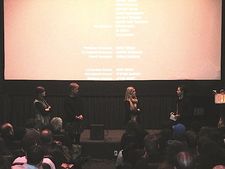 |
| Little Accidents discussion with Summer Shelton, Anne Carey, Sara Colangelo and Anne-Katrin Titze Photo: Benjamin Crossley-Marra |
AKT: There is a lot of texture and attention to detail. One of my favorite scenes is when Diane goes to the school bringing her cupcakes and she is being totally ignored. We are all with her because we don't know if it has to do with her status, her husband's involvement in the accident, or if they simply don't care. The effect is intensely real.
Opening up to questions from the audience, here are some of the filmmakers' responses on casting.
Sara Colangelo: The script had gone out to a bunch of agencies and Elizabeth Banks came to us and let me know, "I like it and would you want to work together." We had an initial Skype conversation and I was just really impressed with her smarts and her wit and intrigued by her interest in moving away from comedy and sinking her teeth into something dramatic again. I had seen her in W and I loved her in the role of Laura Bush. She gave such a subtle and interesting performance that I thought maybe she can play the Southern Belle.
Anne Carey: The business of financing movies is you have a terrific script and you have a really talented person directing but in order to really attract financing you need to have actors of a certain level. Elizabeth's pursuit of us was a big compliment to the project and a reflection of its strength. Boyd [Holbrook] had been someone that you [Sara] knew from the Sundance Lab.
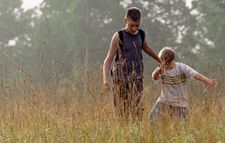 |
| Jacob Lofland as Owen and Beau Wright as James: "For me in the script Beau is levity." |
Sara Colangelo: I had met him initially in the city over coffee. The casting director had said I should meet this guy and at first I thought that he was maybe too good-looking for the part of Amos. I had imagined him more inward and really different. After a few minutes, he told me that he was from coal country and that made a huge difference. He told me that I conveyed this world with dignity and that he really wanted to do it.
Anne Carey: There was a pivotal moment when there was another actor who was interested in the part said: "I'm going to have to go to West Virginia and really immerse myself in the culture." And I remember having a conversation and I thought, we're going to hire somebody who has to immerse himself in the culture versus somebody who knows this genetically? So Boyd became an obvious choice. And, Summer, you had seen Jacob [Lofland] at Sundance.
Summer Shelton: I saw Mud in Sundance and Neckbone [Jacob's character], I didn't even know his name. And I said, "Anne, Sara, look up this kid Neckbone, he is amazing!" He is just mesmerising. He has that face, before he even opens his mouth you want to know what he has to say. He is just so beautiful and such a lovely person. We had a lot of regional casting in Pennsylvania, Kentucky, North Carolina and we really scoured the world to find Beau [Wright].
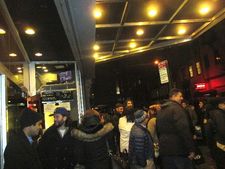 |
| Little Accidents sold out opening night audience exits onto 12th Street. Photo: Anne-Katrin Titze |
Sara: For me in the script Beau is levity. James, the younger brother who has Downs. He is this character who doesn't say much but when he does speak, there's so much clarity and so much truth to it. I imagine the world of this town where everyone is suppressing the truth and their emotions and just not talking about the elephant in the room. And he is on the swing set and he can just say it so openly and matter-of-factly.
Anne-Katrin Titze: You show an interesting contrast to the local boys. Were those real local boys?
Summer: Real local boys. A few drove up from North Carolina, which is maybe a two hour drive.
Anne: Local by any definition!
Summer: If you can get from one place to another and not run out of gas, you're local.
AKT: They seem to know their way around the forest.
Sara: There was one who couldn't actually ride a bike. That was a real problem.
Anne: The other thing that was funny, because they were local boys, we would shoot on Tuesday and then one wouldn't show up on Thursday. "I didn't feel like showing up for work today!" Come on, guys, we're making a movie here! That sense of community was a funny thing. We went into that place and worked with a lot of local actors and local people. That was a community that felt that they had been treated very badly in a number of filmic depictions lately. A huge part of the job was to win them over.
![Chloë Sevigny as Kendra: "There's a scene in the beginning where Owen is talking to his mom [Sevigny]."](/images/newsite/Chloe Sevigny as Kendra_225.jpg) |
| Chloë Sevigny as Kendra: "There's a scene in the beginning where Owen is talking to his mom [Sevigny]." |
AKT: When we were talking earlier, Sara, you said that in order to film in the mine, certain words needed to be cut from the script.
Sara: Yes, and it's understandable, too. They live with these accidents all the time. They are constantly living with that anxiety and they were very nervous that we might associate some violence with the industry itself. In fact, Amos's first testimony used to have some graphic details about the accident, about the smoke. And they said "please take those words out." I was really upset about it and felt that they were censoring me at first. We took it out and I think there was just no way we were going to shoot in any coal mine. They were actually the nicest, most gracious coal mine that we had approached. It was tough, but leaving it to the imagination, hopefully, works.
AKT: The light in the film is great. I loved how you used the times of day. The search in the middle of the film is during the day, and in the end, it is at dusk. The West Virginia light is another character in your film?
Sara: Rachel [Morrison], the DP, and I talked a lot about using natural light as much as possible and the time of day was really important. We couldn't always get the magic hour, obviously. It was so important to get that last scene after the sun came down. It is a character. Appalachia has such beautiful light and actually you lose light very quickly because you are in the hollow and the mountains are surrounding you.
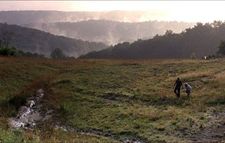 |
| The hills of West Virginia in Little Accidents: "Appalachia has such beautiful light and actually you lose light very quickly…" |
An audience member asked about particularly challenging scenes and Sara referred to a conversation she and I had before the Q&A.
Sara: The scene that we had talked about prior to the Q&A. There's a scene in the beginning where Owen is talking to his mom [Sevigny]. We had this house. It was written for a bathroom and the bathroom was so damn small that we had to actually move it to the bedroom. Originally he was putting the dye in her hair and it was actually a very affectionate moment. We lost a bit of that when we had those blocking challenges. Obviously, the scene in the coal mine was challenging because there was no light and you couldn't set lights up. We really had to work on how the characters were moving in darkness.
AKT: Chloë Sevigny's character now seems to have a slight obsession with her hair. And it still makes sense that she wants to reinvent herself - after the disaster struck the mine in this town. Please talk some more about the location.
Sara: Old coal company towns from the 1940s and 50s - there are a lot of those communities in and around Beckley where all the houses looked the same and that was the kind of town I wanted to paint and portray. We looked around Kentucky, which was beautiful as well.
Summer: It was very beautiful. It's about knowing also where you have your probability working for you.
Anne: There was also the discussion, in which state they will actually let us go into a mine. The day we hit the ground in Beckley, West Virginia, 900 Boy Scouts also descended in Beckley because it's the place of the International Boy Scouts convention. Everything that we thought was easy, affordable and quick was just totally obliterated by a week of 900 Boy Scouts and their parents.
AKT: This is the perfect ending for this Q&A. Thank you for coming.
Little Accidents opened in the US on January 16.





















